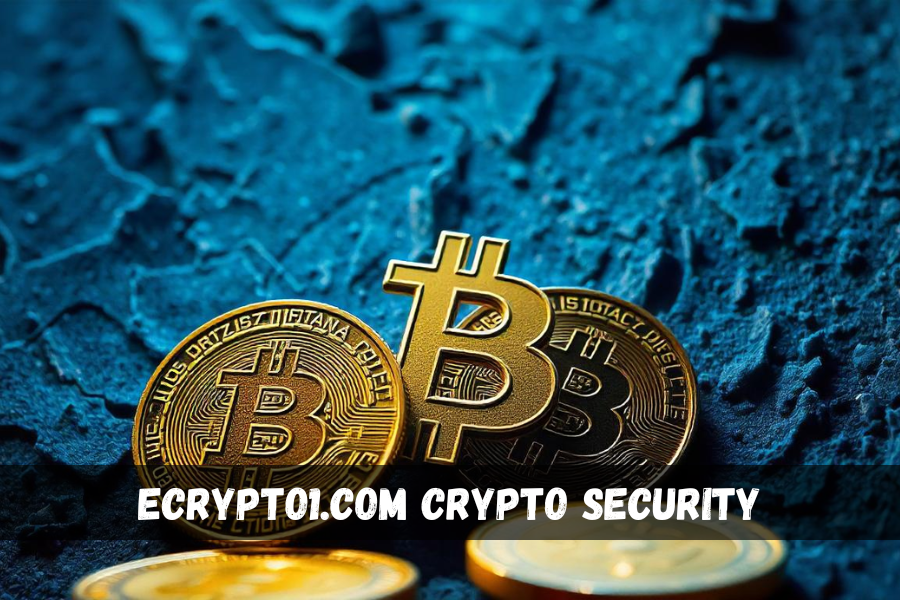The rise of cryptocurrencies has revolutionized finance, offering decentralized and borderless transactions. However, this innovation also brings unique challenges, particularly in the realm of security. Platforms like Ecrypto1.com Crypto Security focus on safeguarding digital assets, ensuring users can trade and store crypto securely. This article explores key aspects of cryptocurrency security, drawing insights from experts and best practices across the crypto ecosystem.
What is Ecrypto1.com Crypto Security?
Cryptocurrency transactions occur on blockchain networks, which are inherently secure. However, the endpoints where users access their funds—wallets, exchanges, and devices—are often vulnerable. Securing these access points ensures the safety of funds from cyberattacks, theft, or accidental loss.
Ecrypto1.com Crypto Security provides resources and tools to help users protect their digital assets while navigating the crypto landscape. By combining education and technology, the platform aims to minimize risks.
The Importance of Crypto Security
Cryptocurrencies are digital assets secured by cryptography. While their decentralized nature eliminates the need for intermediaries, it also shifts the responsibility for security entirely onto users. A single lapse—such as losing a private key or falling for phishing scams—can result in irreversible loss of funds. Platforms like Ecrypto1.com Crypto Security aim to bridge the gap, offering secure infrastructure and resources for individuals navigating the crypto world.
You May Also Like To Read: Crypto30x.com Gigachad: A Deep Dive into High-Risk, High-Reward Cryptocurrency Trading
Key Threats to Cryptocurrency Security
1. Private Key Management
Private keys are the linchpin of crypto ownership. Your money is lost if you lose access to a private key. It’s crucial to store keys securely, preferably offline, using tools like hardware wallets. Sharing keys or using unsecured methods to store them can make you vulnerable to theft or scams.
2. Phishing Attacks
Phishing remains a major threat, where attackers create fake websites or emails mimicking legitimate services to steal user credentials. Awareness and vigilance are vital—always verify URLs and avoid clicking on suspicious links.
3. Public Wi-Fi Vulnerabilities
Accessing crypto accounts over public Wi-Fi can expose sensitive information to hackers. Secure internet connections and Virtual Private Networks (VPNs) are recommended when trading or managing digital assets.
4. Ransomware and Cryptojacking
Data is encrypted by ransomware, which then demands payment to decrypt it. Cryptojacking, on the other hand, uses an unsuspecting victim’s device to mine cryptocurrency. Both are rising concerns in the digital era.
5. Rug Pulls and Fraudulent ICOs
Investors are often lured into fraudulent Initial Coin Offerings (ICOs) or projects, only for the developers to disappear with their funds. Conducting thorough research before investing in new projects is essential.
Security Tools and Practices
1. Hardware Wallets
Hardware wallets, such as Ledger or Trezor, are among the safest methods to store cryptocurrencies. These devices keep private keys offline, protecting them from online attacks. However, they must be safeguarded physically to prevent theft or loss.
2. Two-Factor Authentication (2FA)
Enabling 2FA adds a second layer of protection to crypto accounts. Tools like Google Authenticator or Authy generate time-sensitive codes that are required for account access. Using 2FA apps is safer than relying on SMS-based verification, which can be vulnerable to SIM-swapping.
3. Password Hygiene
Using unique, complex passwords for each account is critical. Password managers can simplify the process by securely storing and generating passwords.
4. Secure Browsing
Ensure the browser you use for crypto activities is up-to-date and equipped with anti-malware software. Additionally, bookmark trusted crypto platforms like Ecrypto1.com Crypto Security to avoid falling for spoofed sites.
5. Cold Storage
For long-term holdings, consider cold storage solutions. These include hardware wallets and offline options like paper wallets. Cold storage minimizes exposure to online threats, making it ideal for safeguarding significant amounts.
You May Also Like To Read: Understanding Gold Price FintechZoom: A Complete Guide for Investors
Advanced Tips for Crypto Security
1. Avoid Downloading Unverified Software
Applications for fake wallets have the ability to fool users into disclosing private keys. Always download software from official sources and verify its authenticity.
2. Use Dedicated Devices
Consider using a dedicated smartphone or computer for cryptocurrency activities. This reduces the risk of malware infection from everyday browsing or downloads.
3. Stay Informed
The crypto space evolves rapidly, and staying updated on new threats and solutions is vital. Subscribe to reliable newsletters or follow trusted crypto blogs and platforms.
4. Diversify Your Storage
Avoid keeping all your funds in a single wallet or platform. Diversifying across multiple wallets can minimize losses if one is compromised.
Secure Internet Connections for Crypto Activities
Public Wi-Fi networks are a significant risk for cryptocurrency users. Hackers can intercept data transmitted over unsecured networks, including wallet information and login credentials. Ecrypto1.com Crypto Security advises users to conduct crypto transactions only over secure internet connections and recommends the use of Virtual Private Networks (VPNs) for added security.
Secure Browsing and Device Management
Ensuring a secure browsing experience is fundamental for crypto activities. Users should keep their browsers updated, avoid clicking on unknown links, and bookmark trusted crypto websites like Ecrypto1.com Crypto Security. Additionally, using a dedicated device for crypto transactions minimizes exposure to malware and other threats.
Device management extends to mobile phones as well. Keeping apps updated and installing antivirus software can significantly reduce risks.
Diversifying and Backing Up Assets
Diversification is a key principle in both investing and securing crypto assets. Instead of storing all funds in a single wallet, users can spread their holdings across multiple wallets. This reduces the impact of a potential breach.
Additionally, backing up wallet information ensures users can recover funds if they lose access to their primary wallet. Ecrypto1.com Crypto Security emphasizes the importance of securely storing backup phrases and recovery keys.
You May Also Like To Read: Understanding FintechAsiaNet Crypto Facto: The Future of Fintech and Cryptocurrency
Conclusion
In conclusion, securing digital assets is essential in the evolving world of cryptocurrency. While blockchain technology provides a strong foundation for secure transactions, vulnerabilities still exist at the user level. Platforms like Ecrypto1.com Crypto Security play a crucial role in bridging the security gap, offering tools, resources, and guidance to ensure safer crypto trading and storage. By following best practices such as using hardware wallets, enabling two-factor authentication, staying informed, and using secure internet connections, individuals can better protect their assets from common threats. As the crypto landscape continues to grow, maintaining vigilance and adopting robust security measures will be the key to safely navigating this innovative space.
FAQs
1. What is Ecrypto1.com Crypto Security and how does it enhance crypto security?
Ecrypto1.com Crypto Security is a platform that focuses on helping users secure their digital assets by providing resources, tools, and guidance on crypto security. It aims to educate users and offer secure infrastructure to minimize risks associated with crypto transactions, storage, and management.
2. What are some common threats to cryptocurrency security?
Some common threats include phishing attacks, private key loss, public Wi-Fi vulnerabilities, ransomware, and fraudulent ICOs. Ecrypto1.com Crypto Security provides valuable information on how to protect against these risks.
3. How can I protect my private keys?
Private keys should be stored securely, preferably offline, using hardware wallets like Ledger or Trezor. Avoid sharing keys or storing them on unsecured devices, and ensure they are kept in a safe physical location to prevent theft or loss.
4. What is two-factor authentication (2FA) and why is it important?
Two-factor authentication (2FA) adds an extra layer of security to your crypto accounts. By requiring a second form of verification, such as a time-sensitive code from apps like Google Authenticator or Authy, it reduces the risk of unauthorized access.
5. Is it safe to use public Wi-Fi for cryptocurrency transactions?
No, public Wi-Fi networks are not secure for crypto transactions. Hackers can intercept data over unsecured networks, making it unsafe to access crypto wallets or exchanges. Ecrypto1.com Crypto Security advises using secure internet connections and recommends Virtual Private Networks (VPNs) for additional protection.
6. What is cold storage and why should I use it?
Cold storage refers to offline storage options for your cryptocurrency, such as hardware wallets or paper wallets. It is a safer way to store large amounts of crypto because it minimizes exposure to online threats like hacking.
7. How can I avoid phishing attacks?
Always verify URLs and ensure that the website you’re visiting is legitimate. Avoid clicking on suspicious links in emails or messages. Using a dedicated device for crypto activities and staying vigilant can help protect against phishing scams.
8. Should I diversify my crypto holdings?
Yes, diversification is a good strategy to mitigate risk. Storing assets across multiple wallets reduces the impact if one wallet or platform is compromised. It’s also important to regularly back up wallet information to avoid losing access to your funds.
9. What are hardware wallets, and how do they enhance security?
Hardware wallets are physical devices that store your cryptocurrency private keys offline. By keeping your keys offline, they are less vulnerable to online attacks such as hacking, phishing, or malware, making them one of the safest ways to store crypto.
10. How can I stay informed about crypto security?
Staying updated on crypto security threats and best practices is essential. Subscribe to reputable crypto blogs, newsletters, or platforms like Ecrypto1.com Crypto Security to receive the latest insights and tips on how to protect your digital assets.
Explore the latest news and updates on LET MAGAZINE Best Regards!



